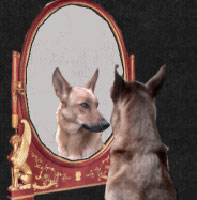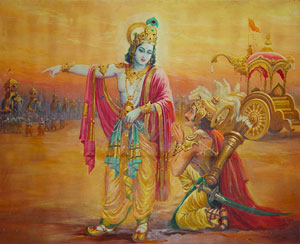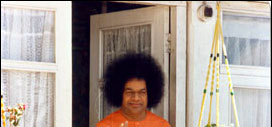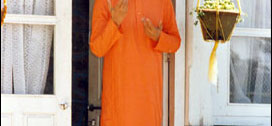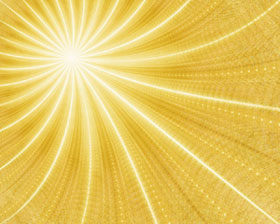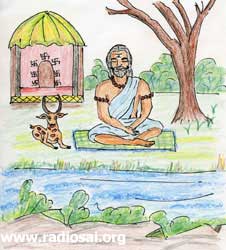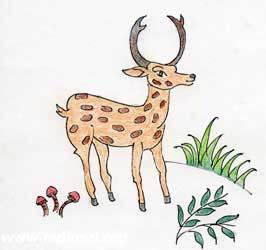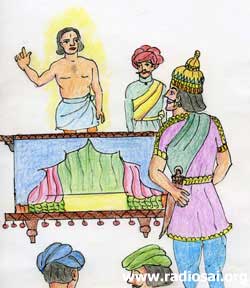 |
 |
 |
 |
| Volume 4 - Issue 07 JULY 2006 |
|
VISION OF THE NON-DUAL - PART 6 LEADING A LIFE OF FEARLESSNESS AND FREEDOM… - A choice between Deha Dharma and Atma Dharma Life confronts us with so many choices every day. These choices always lead to only two scenarios - either it further our progress on the spiritual path or take us back. Now, progress on the spiritual path is defined as anything which helps us to reveal our true nature as a divine being, forever selfless and blissful. And the opposite that which gives us joys which are temporary and come from selfishly enjoying bodily pleasures. But how do we orientate ourselves towards the divine with our every step and breath? That is what we intend to deal with in this article. Swami has told us that we can either make choices that further our life as a separate body, or make choices that are in consonance with the Atma or spirit (or the Self).
The Greek Philosopher A well-known Greek philosopher once happened to meet an Indian yogi. In the course of their conversation he said to the yogi. “The most worthy and fruitful study, is the study of man.” The yogi agreed with him and then added “But how can you know man without knowing God?” ‘Man Know Thyself’ therefore means realize your divine/true nature. What the yogi meant was that the deha dharma pertaining to the individual is not the final state. Only enlightenment proper, leads to the practice of Atma Dharma. Swami says,
The Choices - Deha Dharma and Atma Dharma To understand why there is this enormous disparity we need to learn about the two important dharmas that Swami refers to - deha dharma and Atma Dharma. Deha Dharma means those duties we discharge as a member of society, based on caste, age, sex, nationality and so on, all centred around the belief that we are a separate body. Among Hindus, Manu the Lawgiver has laid the codes down and these are known as Smritis; of course, every culture will have its own mores and customs. Deha dharma applies to our daily life and helps to create harmony, order and respect among people. It also permits us to enjoy ourselves, within decent boundaries, as much as we wish without reproach. Deha dharma leads to the heavenly worlds, but also to the round of birth and death. It does not lead us to liberation. Yet for those on the spiritual path a higher path beckons which ultimately makes us free from all selfishness and desires, and leads us onto the path of liberation. This is Atma Dharma or Swaha Dharma. We may have instances when we are living by Atma dharma (albeit temporarily) – such as when we put someone else’s needs before our own; when our heart feels another’s pain; or when we decide to question our selfish traits and orientate ourselves towards a more selfless life. Then we know the peace, bliss and total contentment of Atma Dharma which is totally free from doubts, confusion and dualities of any kind. A life lived in this way, in the permanent consciousness of our true self shines ever in the service of others. We know such people as saints, prophets and yogis who live the “life divine” and are examples of Atma Dharma, ever One with the Non-Dual Reality. They live beyond all categories altogether (right/wrong and happy/sad); no duties need to be performed by them for by seeing the One in all, they are in a state of total freedom where the Atma and Atma Dharma are one, and their life is a blessing to the world. The important aspect of this Dharma, as Swami says is “seeing the one in all, and the all as one”. Room Full of Mirrors
Swami says “Change your perceptions of the world, and the world changes for you. Many of us move around the world wearing glasses (spectacles) of envy, fear, worry, anger, etc and so the world appears as a terrible place. “Wear the glasses of Love instead” says Swami. This will help transmute deha dharma to Atma Dharma. Arjuna’s Dilemma and Deliverance One of the most famous examples of the transition from deha dharma to Atma Dharma concerns Krishna’s transformation of Arjuna on the battlefield of Kurukshetra. Swami has revealed that Krishna and Arjuna were inseparably together for seventy five years but at no time during that period, did Krishna teach the Gita to Arjuna. Why? Because during all those years, Arjuna treated Krishna as his brother-in-law and a close friend. During all those years, Arjuna was living with body-consciousness. The moment Arjuna surrendered, Krishna was ready to impart the Divine Message. Surrender, thus, is the right approach, as it takes one beyond the powerful delusion that one is a body-ego who must make all decisions for one’s own advantage. Swami adds that although Arjuna had declared that he had surrendered to the Lord, he was still subservient to the triumvirate of the senses, the body and the mind - a powerful combination which invariably steers one in the wrong direction. However, he had sought refuge in and appealed to Krishna, and the ever-compassionate Lord was only too willing to do the needful even though, Arjuna's surrender at that stage was perhaps not yet complete; but no molly coddling! Thus, Krishna asks Arjuna sternly:
To confuse the body with oneself and pine for the body as if something has happened to one is delusion. The body is but a mere inert vehicle for the Indweller or the Atma. It is transient whereas the Atma is eternal. When Arjuna used words like "I" and "mine", he meant the body or the lower self (i.e., the complex involving the gross physical body plus the mind) whereas what is eternal and therefore meaningful is the Atma or the Real Self. This misplaced identification, also called body-consciousness, is sometimes comprehensively referred to as ego or Ahamkara. (Ego as used in spirituality means much more than what dictionaries convey; basically it implies body-consciousness). What Should We Do To Lead A Truly Divine Life? Arjuna was not alone suffering from ego; all of us do, which is why death, especially of near ones, affects our feelings. So what is one to do? Firstly, we must, as Arjuna was told, make a conscious effort to realise actually that body is transient. Having done that, we must also not give the body excessive importance; instead it is the Atma which must constantly remain in our focus. Secondly, we must appreciate that life is but a bit of playacting (in a drama scripted by the Blessed Lord). Thirdly, we must not goof our part by forgetting the script/dialogue (meaning, we must not forget to do our duty). Swami's advice in this context is worth remembering, Do all Karma (action/duty) as actors in a play, keeping your identity separate and not attaching yourself too much to your role. Remember that the whole thing is just a play and the Lord has assigned to you a part; there your duty ends. He has designed the play, and He enjoys it.
In that case, why at all is the person engaged in action? Because he considers it to be his duty. Of course, this is not the way people normally behave. They engage in action because of specific desires. Krishna tells Arjuna your outlook should be similar; always seek to perform your duty, but do not claim the fruits thereof - that is what desireless action really means. Some hold that thinking about and working for rewards is totally wrong and immoral. Swami has categorically refuted this point of view and observes:
So there is nothing immoral in aspiring for the rewards of one's actions or effort. However, there is a catch! As Swami says:
The Sun God’s Dilemma
The non-dual vision of the Atma, destroys all darkness of ignorance. Man rises above deha (body) dharma to find peace and bliss in the realm of the Atma. Our Swami has said on several occasions: “I do not know what worry, sorrow and suffering are.” That is the sure indication of Atma Dharma. But we mortal devotees go to Him with our sorrows, our fears, and our worries hoping for (albeit temporarily) release from them. These are the limitations of deha dharma. “The Unlimited is always with the Atma alone” says Swami. We end with an interesting story about Jadabharata from the Upanishadic times where aspects deha dharma, prior to atmic realization, are brought out beautifully. The Story of Jadabharata King Satyavrata of ancient times was a wise and just ruler. His kingdom flourished and all the people were happy and prosperous. As days went by, the king grew old and so he handed over the reins of his kingdom to his son, and as per the dharmic codes, proceeds to the forests for a life of austerities and tapas. (Vanaprastha stage of ashram dharma). So great is the dispassion and renunciation of the king, that he gives up all worldly attachments and luxuries of life. He builds a small hut for himself by the side of a flowing river and lives an austere, spartan life devoted to meditation and contemplation. He lives on the herbs, roots and fruits growing in the forest.
The king is therefore born as a deer in his next life. Due to the great austerities of his past life, the deer is aware of its past and wanders in solitude visiting sacred places, wherever the Name of God is chanted or sung, etc. The deer duly passes away in this manner. Swami says, “Surroundings conducive to the jiva’s spiritual growth in its next life, depend on the effects of its past karmas.”
Seeing his unresponsive attitude, the king threathens and draws his sword, in order to make him speak. It is said that Jadabharata opens his mouth for the first time and speaks the highest philosophy to the king.
- Sri S Suresh Rao Dear Reader, how did you like this article? would you like more articles on this series of 'Vision of Non-duality'? Please tell us know at h2h@radiosai.org. Please mention your name and country when you write to us. Thank you for your time. – Heart2Heart Team |
| You can write to us at : h2h@radiosai.org |
Vol 4 Issue 07 - JULY 2006
|
Best viewed in Internet Explorer - 1024 x 768 resolution. |
DHTML Menu by Milonic. |

